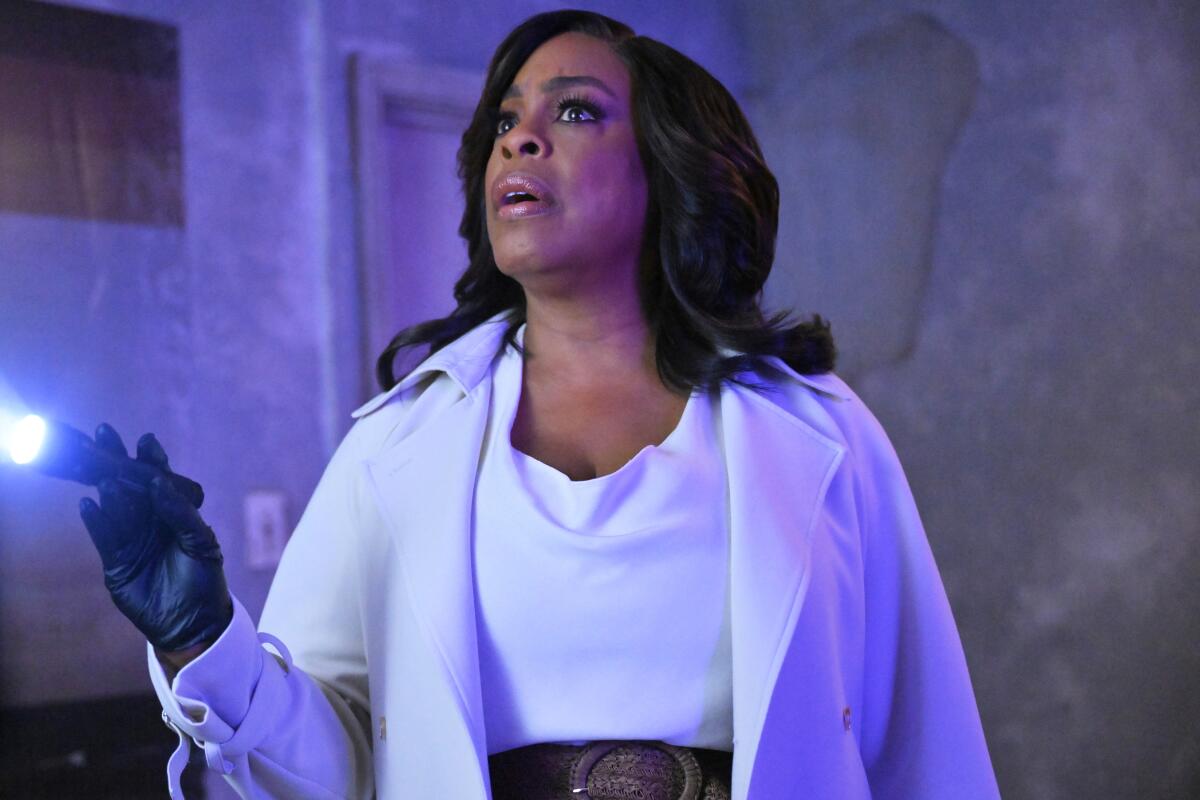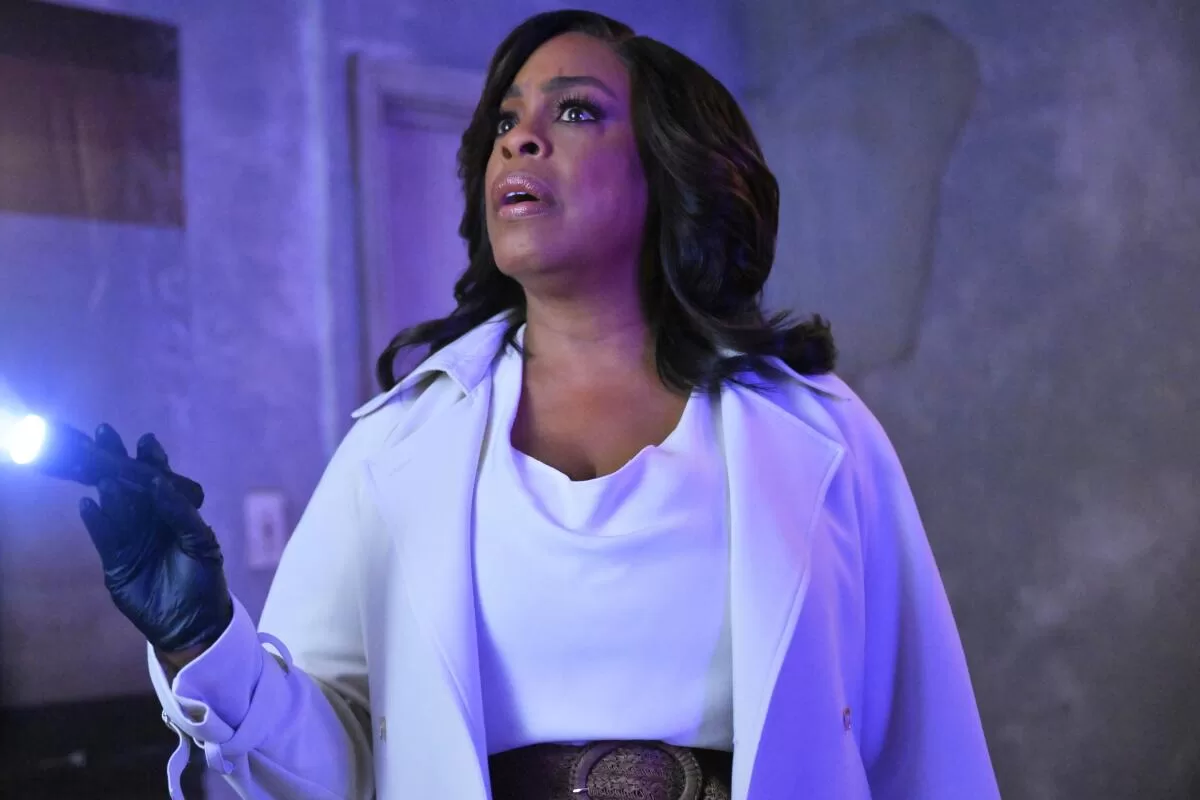About halfway through the new season of “Monsters,” Ryan Murphy’s anthology series about people who do very bad things, Kitty Menendez (Chloë Sevigny) explains why she hates kids — not just her kids, the parricidal Lyle and Erik Menendez, but all kids.
“They strip the calcium from your bones as they grow inside you,” she tells her therapist. “They wreck your body as they eat you alive.”
Is it a particularly gruesome description of how it feels to carry a child? Of course it is. For Murphy, whose imprint often seems to be on every other work of television, entertainment is a series of baroque monstrosities, human and otherwise.
“Monsters” hit Netflix only about a week before the first two episodes of the new series “Grotesquerie” arrived on FX and Hulu. That’s a big dose of Murphy, who co-created both projects with flourishes familiar to fans of his oeuvre, including “American Horror Story,” “Feud” — the most recent installment of which focused on Truman Capote’s crash-and-burn relationship with ladies of New York high society — and “Ratched,” a macabre and admirably vivid prequel to “One Flew Over the Cuckoo’s Nest.” Large helpings of camp and melodrama propel grisly tales of ghoulish behavior. There’s generally a plea for social tolerance beneath the broiling surface. And gore. Lots of gore.
When we meet Lyle and Erik Menendez (Nicholas Alexander Chavez and Cooper Koch) they’re in a limousine listening to Milli Vanilli as Lyle enthuses about the new chicken wing franchise he wants to launch. They’re on their way to their parents’ funeral, and unless you’ve been living in a cave for the past 30 years, you know they blasted those parents into the next world, in their own home, with shotguns. The series shows us the horrific deed multiple times, in several possible iterations, as it seems to weigh various questions. Were the brothers traumatized abuse victims who’d finally had enough, or spoiled sociopaths (or both)? Is there any possible way that Kitty and Jose (Javier Bardem), not Lyle and Erik, were the real monsters? And could we perhaps see that graphic carnage one more time?
Murphy has explained that he was aiming for a sort of Rashomon effect, telling the Menendez story from different angles, refusing to insist on a definitive version of the truth. The approach yields some strange results, including an over-reliance on Dominick Dunne (Nathan Lane), who covered the case for Vanity Fair and apparently hosted a whole lot of gossipy dinner parties (in these moments we seem to be back in the land of Capote and “Feud”). Dunne’s daughter, Dominique, was murdered some years back, and in ”Monsters” he harbors deep animosity for heartstring-plucking defense attorneys like Leslie Abramson (Ari Graynor), who represents and fawns over Erik. Though even she can’t cover up the fact that the Beverly Hills brothers went on a high-end shopping spree after they killed their parents. “Monsters” is, among other things, a wicked parody of affluenza.
“Monsters” leans into the premise that Jose repeatedly raped both of his sons, and as he explains that he wants to mold his kids into young Romans, hardened in a spirit of manly pain and love, it’s hard not to shiver a little. Bardem, as always, understands the assignment, and his Jose, sadistically, instinctively autocratic, earns a place among the actor’s gallery of evil, alongside Anton Chigurh of “No Country for Old Men” and Raoul Silva of “Skyfall.” If there’s any justice, someday he’ll decide to take on Richard III.

Niecy Nash-Betts stars as Det. Lois Tryon in FX’s “Grotesquerie.”
(Prashant Gupta / FX)
One measure of Murphy’s appeal is the number of superb actors lining up to occupy his world, a very partial list of whom includes Sarah Paulson, Jessica Lange, Tom Hollander, Naomi Watts, Angela Bassett and John Carroll Lynch. That list also includes Niecy Nash-Betts, a supporting player in Season 1 of “Monster” (singular, focusing on Jeffrey Dahmer), who plays bone-tired police Det. Lois Tryon in “Grotesquerie.” The title could be affixed to most of Murphy’s work, but he ups the Grand Guignol-ante in the new series’ opening minutes, when Tryon walks into a murder scene wherein a family has apparently been forced to eat part of their paterfamilias (and you thought shotguns were bad). Things progress from there, with ritualistically staged murders, blood-draining, and even an elaborate (and actually rather impressive) tableau of The Last Supper, featuring slain homeless people.
Where the monsters of “Monsters” are all recognizably human, “Grotesquerie” suggests something more cosmic at work, like a darkness summoned in a story by horror master H.P. Lovecraft, or at least “Se7en.” Like that David Fincher movie, “Grotesquerie” wraps its ills in a grimy, nocturnal film, and tops them with a crown of thorns. The heavy-drinking Tryon, whose daughter (Raven Goodwin) seems determined to eat herself into an early grave and whose philandering philosophy professor husband (Courtney B. Vance) lies in a coma, accepts the help of a bird-like nun/journalist, Sister Megan (Micaela Diamond), who helps decode the not-terribly-subtle biblical implications of this murder spree. “To understand this monster,” she tells Tryon, “you must reach the ecstatic.”
We’re a good ways from the wealthsploitation of “Monsters,” but barely less over the top: After discussing the theological dimensions of the carnage with Sister Megan, young Father Charlie (Chavez, doing double Murphy duty here) vigorously masturbates and then flagellates his back into a bloody pulp. Let he who is without sin swing the first cat o’ nine tails.
That same masochistic priest reveals to Sister Megan that his all-time favorite serial killer is Ed Gein, the real-life, grave-robbing Wisconsin psycho who inspired “Psycho” (Robert Bloch’s novel and Alfred Hitchcock’s movie), “The Texas Chainsaw Massacre” — and the next installment of “Monster,” starring Charlie Hunnam, already announced. Murphy World can feel like an echo chamber, similar in scope if not tone or subject to Taylor Sheridan’s tales of the West, headlined by “Yellowstone.”
The constant is monstrousness, or grotesquerie, presented with a nod and a wink that doesn’t lessen the viewer’s subsequent impulse to take a shower. There are other flavors of horror on TV, including the Lovecraft-like works of Mike Flanagan (“Midnight Mass,” “The Fall of the House of Usher”), which balance sensation with a more literary bent. But Murphy seems more tailor-made for these times. Early in “Grotesquerie,” Tryon speculates about the kinds of stories her new journalistic friend’s readership seeks: “the more gruesome, the better.” To which Murphy might add: glory hallelujah.
